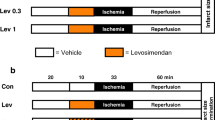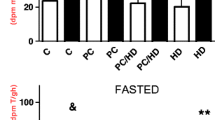Abstract
Objectives. A possible link between activation of PKC and improvement of energy metabolism during reperfusion in ischemic preconditioning hearts was examined. Methods. Isolated perfused rat hearts were preconditioned by 5-min ischemia and 5-min reperfusion in the presence and absence of a PKC inhibitor polymyxin B (50 μM) and then subjected to 40-min sustained ischemia and subsequent 30-min reperfusion. In another set of experiments, the hearts pretreated with and without a PKC activator PMA (15 pmol/5 min) were subjected to the sustained ischemia and reperfusion. Myocardial high-energy phosphates, glycolytic intermediates and mitochondrial oxygen consumption capacity were determined at appropriate experimental sequences. Results. Preconditioning enhanced the recovery of cardiac function such as left ventricular developed pressure, heart rate and rate-pressure product of the reperfused heart, suppressed the release of creatine kinase, enhanced the reperfusion-induced restoration of myocardial high-energy phosphates, attenuated the reperfusion-induced accumulation in glucose 6-phosphate and fructose 6-phosphate contents, abolished the ischemia-induced increase in tissue lactate content and prevented the ischemia-induced decrease in mitochondrial oxygen consumption capacity. Treatment of the perfused heart with PMA mimicked the effects of preconditioning on post-ischemic contractile function, enzyme release, levels of myocardial energy store, glycolytic intermediates and lactate, and mitochondrial function. Polymyxin B-treatment abolished the preconditioning-induced recovery of post-ischemic contractile function, the suppression of the release of CK, the restoration of myocardial energy store, and the preservation of mitochondrial function, whereas it did not cancel the improvement of glycolytic intermediate levels and the reduction in tissue lactate accumulation. Post-ischemic contractile function was closely related to restoration of high-energy phosphates and mitochondrial oxygen consumption capacity in all hearts subjected to ischemia/reperfusion. Conclusion. The results suggest that activation of PKC and preservation of mitochondrial function are closely linked with each other in the preconditioned heart, which may lead to the improvement of post-ischemic contractile function.
Similar content being viewed by others
Author information
Authors and Affiliations
Additional information
Received: 29 January 1999, Returned for 1. revision: 26 February 1999, 1. Revision received: 27 April 1999, Returned for 2. revision: 18 May 1999, 2. Revision received: 12 July 1999, Returned for 3. revision: 26 July 1999, 3. Revision received: 25 October 1999, Accepted: 3 November 1999
Rights and permissions
About this article
Cite this article
Yabe, Ki., Tanonaka, K., Koshimizu, M. et al. A role of PKC in the improvement of energy metabolism in preconditioned heart. Basic Res Cardiol 95, 215–227 (2000). https://doi.org/10.1007/s003950050184
Issue Date:
DOI: https://doi.org/10.1007/s003950050184




